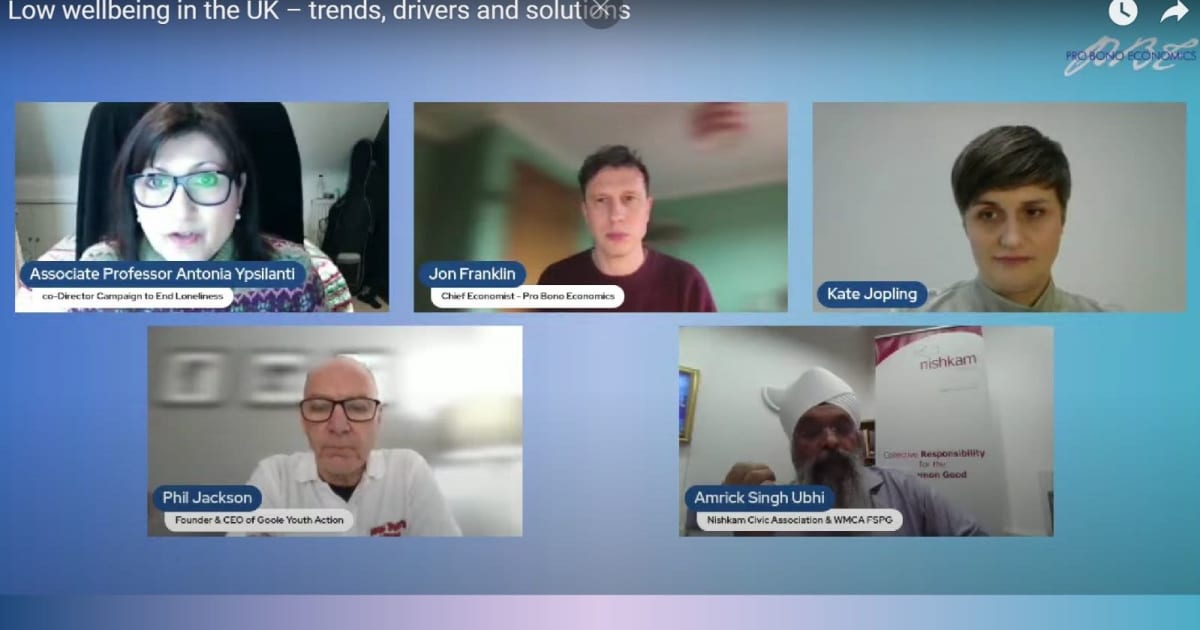By Becci Fitzjohn, Digital Communications Officer
Last week, we brought together experts from local government and civil society to discuss findings from our first annual report on low wellbeing and loneliness in the UK.
241 people joined the session, chaired by Dr. Antonia Ypsilanti, Associate Professor in Cognitive Psychology at Sheffield Hallam University. Speakers included Amrick Singh Ubhi, Director of Civic Engagement and Partnerships at Nishkam Civic Association and Chair of West Midlands Combined Authority’s Faith Strategic Partnership Group; Kate Jopling, independent policy and strategy consultant; Phil Jackson, Founder and CEO of Goole Youth Action; and PBE’s Chief Economist, Jon Franklin.
Jon Franklin began the webinar by explaining why PBE prioritises wellbeing and its measurement. He highlighted that wellbeing—defined as how we’re feeling and functioning—captures people’s fundamental quality of life. Jon emphasised that PBE believes those with the lowest wellbeing need the most support from the public, private, and social sectors.
He presented the latest trends in wellbeing, analysed the groups struggling the most, and explored the critical drivers of low quality of life.
“We don’t want anyone to be living with poor quality of life. If we could halve the number of people experiencing low wellbeing in the UK, it would deliver £54 billion in economic benefits every year.”
Jon also addressed loneliness as a significant and often overlooked factor, saying the rise in chronically lonely adults in the UK “should be a real concern for the government, and for us as a society.” PBE’s deep dive on this key driver of low wellbeing suggests that there are five million adults in the UK struggling with persistent loneliness, with people under 30, women, those who are separated from their partners, the unemployed, and those reporting poor health most likely to be affected.
Kate Jopling discussed the importance of defining low wellbeing and loneliness in the context of public policy.“Loneliness is a really important, human issue to get hold of. But let’s not confuse the everyday experience of sometimes feeling lonely with the problematic, chronic loneliness that needs addressing in public policy.”
Responding to a question from an audience member, Jon noted the complex but important relationship that appears to exist between wellbeing and housing tenure. Our analysis suggests those living in private rented accommodation experience a significantly increased risk of low wellbeing compared to those in owner-occupied or social housing. Furthermore, social housing seems to have a protective impact that private rental housing does not. We’ll be digging into this topic further in 2025.
On policy solutions, Phil advocated for investment in close, trusted adult support programmes for young people. Amrick Singh Ubhi also emphasised the need to prioritise upstream preventative measures, stating, “We’re constantly robbing Peter to pay Paul. Let’s recognise that downstream interventions cost, and the impact can be prevented by tackling problems upstream.”
The webinar concluded with a strong call for the government to refresh its loneliness strategy, adopt a nuanced approach to tackling loneliness, and recognise the economic benefits and savings of addressing this issue.
As Kate Jopling succinctly put it, “Government isn’t going to achieve its missions without tackling loneliness.”
The webinar created a platform for engaging discussions about the differences between acute and chronic low wellbeing in the UK and how we can begin to address wellbeing poverty.
You can read the full report here: Mind, body and connection: Low wellbeing in the UK 2024 | Pro Bono Economics
If you’re interested in continuing the conversation, sign up for our newsletter to stay informed about our 2025 events programme and the next annual wellbeing report.
